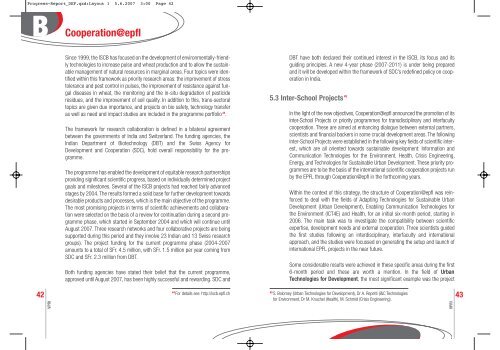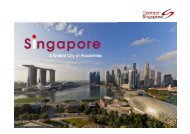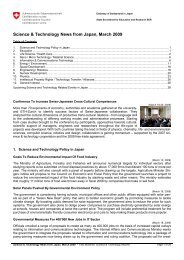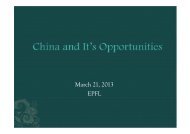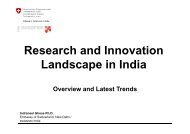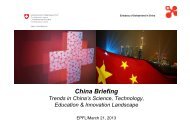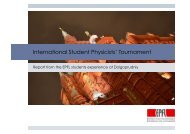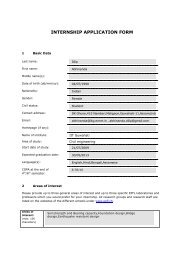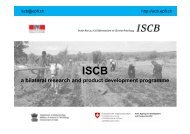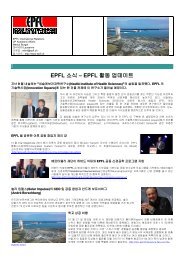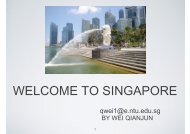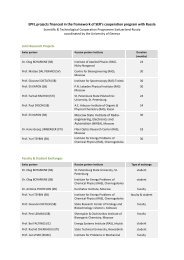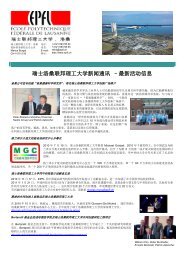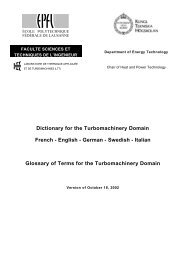International Affairs - Relations Internationales - EPFL
International Affairs - Relations Internationales - EPFL
International Affairs - Relations Internationales - EPFL
You also want an ePaper? Increase the reach of your titles
YUMPU automatically turns print PDFs into web optimized ePapers that Google loves.
Progress-Report_DEF.qxd:Layout 1 5.6.2007 3:00 Page 42<br />
B Cooperation@epfl<br />
42<br />
VPRI<br />
Since 1999, the ISCB has focused on the development of environmentally-friendly<br />
technologies to increase pulse and wheat production and to allow the sustainable<br />
management of natural resources in marginal areas. Four topics were identified<br />
within this framework as priority research areas: the improvement of stress<br />
tolerance and pest control in pulses, the improvement of resistance against fungal<br />
diseases in wheat, the monitoring and the in-situ degradation of pesticide<br />
residues, and the improvement of soil quality. In addition to this, trans-sectoral<br />
topics are given due importance, and projects on bio safety, technology transfer<br />
as well as need and impact studies are included in the programme portfolio 44 .<br />
The framework for research collaboration is defined in a bilateral agreement<br />
between the governments of India and Switzerland. The funding agencies, the<br />
Indian Department of Biotechnology (DBT) and the Swiss Agency for<br />
Development and Cooperation (SDC), hold overall responsibility for the programme.<br />
The programme has enabled the development of equitable research partnerships<br />
providing significant scientific progress, based on individually determined project<br />
goals and milestones. Several of the ISCB projects had reached fairly advanced<br />
stages by 2004. The results formed a solid base for further development towards<br />
desirable products and processes, which is the main objective of the programme.<br />
The most promising projects in terms of scientific achievements and collaboration<br />
were selected on the basis of a review for continuation during a second programme<br />
phase, which started in September 2004 and which will continue until<br />
August 2007. Three research networks and four collaborative projects are being<br />
supported during this period and they involve 23 Indian and 13 Swiss research<br />
groups). The project funding for the current programme phase (2004-2007<br />
amounts to a total of SFr. 4.5 million, with SFr. 1.5 million per year coming from<br />
SDC and SFr. 2.3 million from DBT.<br />
Both funding agencies have stated their belief that the current programme,<br />
approved until August 2007, has been highly successful and rewarding. SDC and<br />
44 For details see: http://iscb.epfl.ch<br />
DBT have both declared their continued interest in the ISCB, its focus and its<br />
guiding principles. A new 4-year phase (2007-2011) is under being prepared<br />
and it will be developed within the framework of SDC’s redefined policy on cooperation<br />
in India.<br />
5.3 Inter-School Projects 45<br />
In the light of the new objectives, Cooperation@epfl announced the promotion of its<br />
Inter-School Projects or priority programmes for transdisciplinary and interfaculty<br />
cooperation. These are aimed at enhancing dialogue between external partners,<br />
scientists and financial backers in some crucial development areas. The following<br />
Inter-School Projects were established in the following key fields of scientific interest,<br />
which are all oriented towards sustainable development: Information and<br />
Communication Technologies for the Environment, Health, Crisis Engineering,<br />
Energy, and Technologies for Sustainable Urban Development. These priority programmes<br />
are to be the basis of the international scientific cooperation projects run<br />
by the <strong>EPFL</strong> through Cooperation@epfl in the forthcoming years.<br />
Within the context of this strategy, the structure of Cooperation@epfl was reinforced<br />
to deal with the fields of Adapting Technologies for Sustainable Urban<br />
Development (Urban Development), Enabling Communication Technologies for<br />
the Environment (ICT4E) and Health, for an initial six-month period, starting in<br />
2006. The main task was to investigate the compatibility between scientific<br />
expertise, development needs and external cooperation. Three scientists guided<br />
the first studies following an interdisciplinary, interfaculty and international<br />
approach, and the studies were focussed on generating the setup and launch of<br />
international <strong>EPFL</strong> projects in the near future.<br />
Some considerable results were achieved in these specific areas during the first<br />
6-month period and these are worth a mention. In the field of Urban<br />
Technologies for Development, the most significant example was the project<br />
45 S. Bolomey (Urban Technologies for Development), Dr A. Repetti (I&C Technologies<br />
for Environment, Dr M. Knuchel (Health), M. Schmid (Crisis Engineering).<br />
VPRI<br />
43


